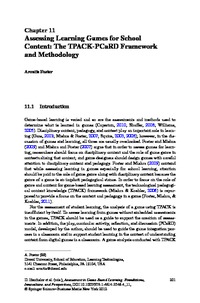Assessing Learning Games for School ContentThe TPACK-PCaRD Framework and Methodology
Aroutis Foster
Zu finden in: Assessment in Game-Based Learning (Seite 201 bis 215), 2012
|
 |
 Diese Seite wurde seit 5 Jahren inhaltlich nicht mehr aktualisiert.
Unter Umständen ist sie nicht mehr aktuell.
Diese Seite wurde seit 5 Jahren inhaltlich nicht mehr aktualisiert.
Unter Umständen ist sie nicht mehr aktuell.
 Zusammenfassungen
Zusammenfassungen
Game-based learning is varied and so are the assessments and methods used to determine what is learned with games. The author used two studies conducted in different settings to illustrate the role of technological pedagogical content knowledge (TPACK) and play, curricular activity, reflection, and discussion (PCaRD) in game-based learning. In the first project in an after-school study in a computer lab, 26 middle school students played a game for 7 weeks. Assessments were created using a game analysis based on TPACK to examine learning and motivation TPACK allowed for the creation of assessments that focused on the content in a game and highlight the genre effect on pedagogy in gameplay. In the second study conducted with 21 high school learners, TPACK played the same role; however, PCaRD was used to integrate the game into a classroom. The integration process included the previously developed assessments for learning and motivation. Whereas TPACK provides a lens to analyze digital games for pedagogy and content, PCaRD provides a pedagogical model for integrating games into learning settings. This has implications for designers of games, teachers using games, and researchers studying games for learning.
Von Aroutis Foster im Buch Assessment in Game-Based Learning (2012) im Text Assessing Learning Games for School Content  Dieses Kapitel erwähnt ...
Dieses Kapitel erwähnt ...
 Dieses Kapitel erwähnt vermutlich nicht ...
Dieses Kapitel erwähnt vermutlich nicht ... 
 Nicht erwähnte Begriffe | Schule, Unterricht |
 Tagcloud
Tagcloud
 Anderswo finden
Anderswo finden
 Volltext dieses Dokuments
Volltext dieses Dokuments
 |  Assessing Learning Games for School Content: The TPACK-PCaRD Framework and Methodology: Artikel als Volltext bei Springerlink ( Assessing Learning Games for School Content: The TPACK-PCaRD Framework and Methodology: Artikel als Volltext bei Springerlink ( : :  , 284 kByte; , 284 kByte;  : :  2020-11-28) 2020-11-28) |
 Anderswo suchen
Anderswo suchen 
 Beat und dieses Kapitel
Beat und dieses Kapitel
Beat hat Dieses Kapitel während seiner Zeit am Institut für Medien und Schule (IMS) ins Biblionetz aufgenommen. Beat besitzt kein physisches, aber ein digitales Exemplar. Eine digitale Version ist auf dem Internet verfügbar (s.o.). Es gibt bisher nur wenige Objekte im Biblionetz, die dieses Werk zitieren.









 LehrerIn
LehrerIn TPCK-Modell
TPCK-Modell
 Biblionetz-History
Biblionetz-History